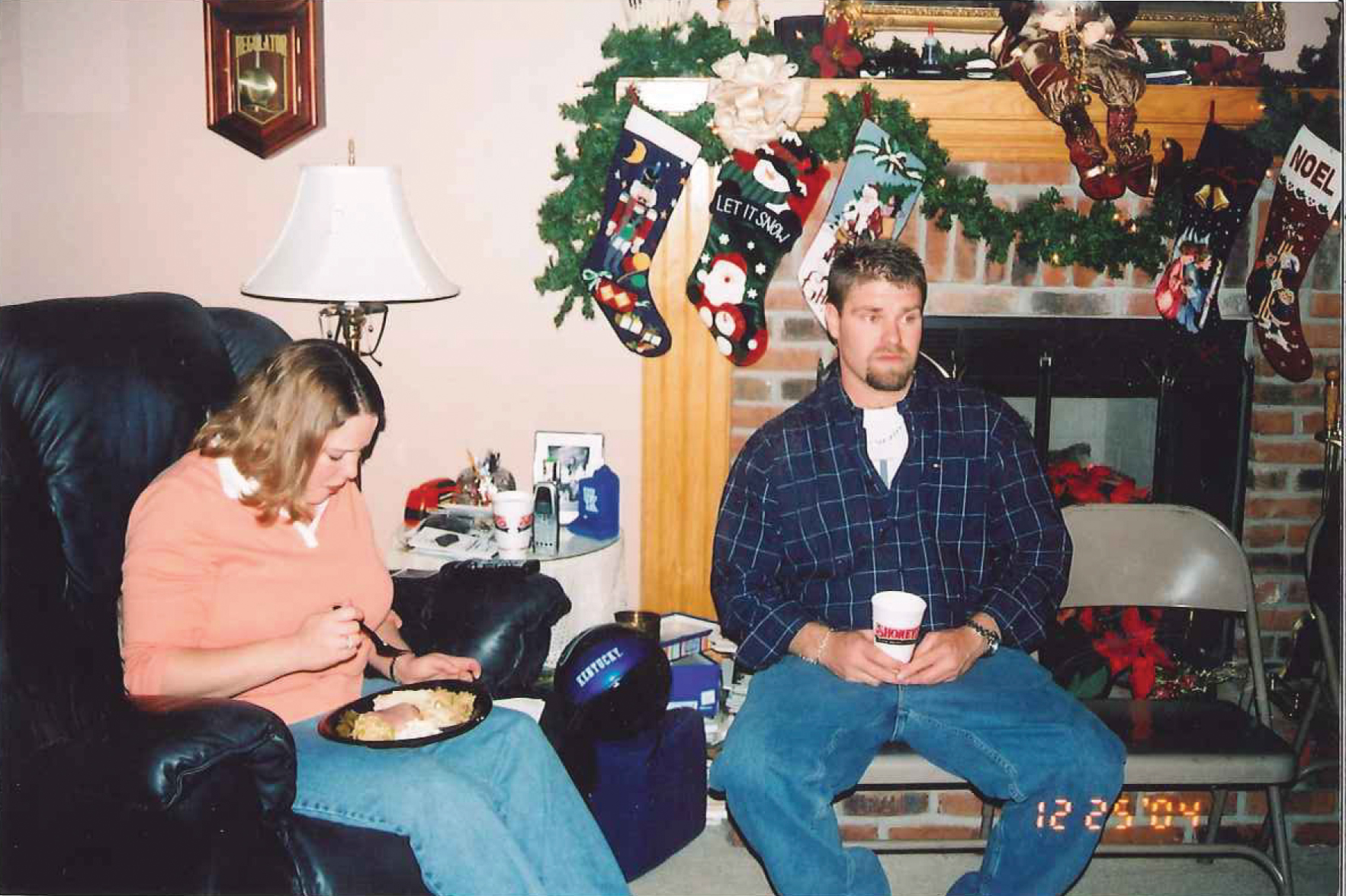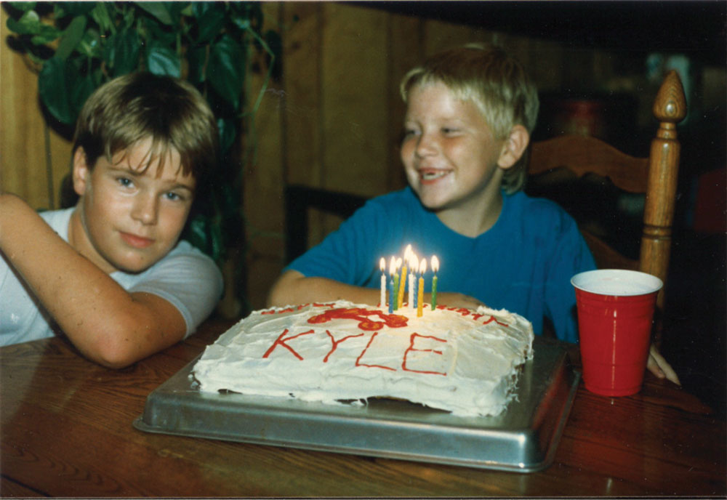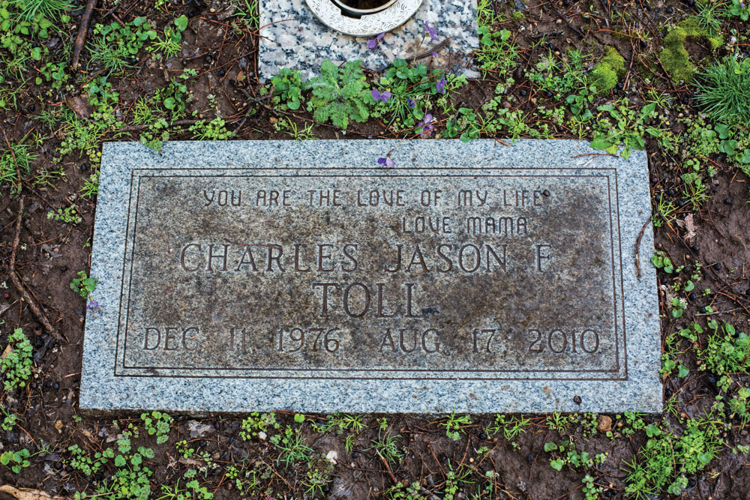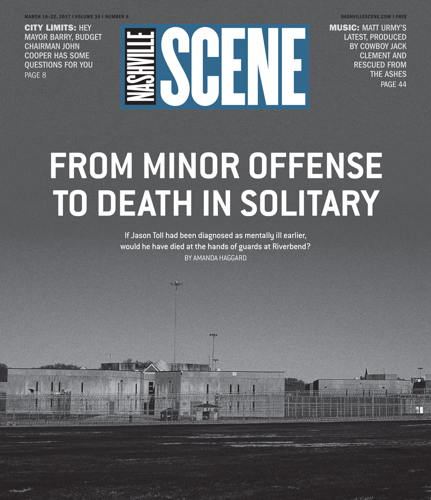
The last sound Charles Jason Toll made was a snoring noise — a “death rattle” signaling that he was in his last minutes of life.
In late August 2010, Toll, 33, was in an ongoing argument with a guard at Riverbend Maximum Security Institution that had escalated. A commander at the prison decided to forcibly remove Toll from his solitary-confinement cell, using a team of guards in what is called a cell extraction. Footage of the incident shows that Toll was noticeably agitated, his head covered in a white shirt.
“LET’S GET IT ON, GODDAMN IT,” he screams through a small opening in the door.
Five guards enter his cell, surround him and apply shackles to his feet and hands. As the guards place him face down on the floor outside his cell, he calls out that he can’t breathe. A guard says, “Put your arm out or I’ll tase you,” and Toll replies, “I can’t, goddamn it.” Over the next half-hour, Toll will warn a dozen times that he can’t get any air.
“Yeah, you’re not gonna be able to breathe,” an officer responds at one point.
As the guards drag Toll out to a recreation yard surrounded by chain-link fence and barbed wire, the video goes dark. It was 80 degrees outside that night, and the lights in the yard were broken. Some light shines into the frame, and a guard can be seen pushing down on Toll’s back with a taser shield. The shield is removed minutes later, and the guards begin to strip him down: As they pull off his shirt, his head bobbles and hits the concrete.
This is when the snoring starts, and the guards remove his leg irons, handcuffs and silver chain necklace, roll him onto his back and call for medical assistance to check him. A nurse arrives and attempts to talk to Toll.
“Mr. Toll? Mr. Toll? Mr. Toll? Mr. Toll?” she says.
The video shows Toll’s face from the side as the nurse checks for his pulse. Two minutes later, she begins CPR. A guard is heard saying that Toll might be dead.
“Please don’t say that word,” one guard says.
“You gotta be kiddin’ me!” says another.
There is an attempt to use a defibrillator and a breathing machine before the paramedics arrive. The guards deliver a summary, saying they were “in a cell extraction, and he was raising hell in his cell, and he walked out there 30 minutes ago and he fell out, and he’s been out ever since.”
He is lifted onto a gurney and pushed through the prison as other inmates can be heard screaming. At 10:12 p.m., Toll is rolled into an ambulance, and the tape clicks off.
Toll had been in solitary confinement for seven months, spending less than an hour outside his cell each day. Day in, day out, he spent most of his time in a space that is essentially the size of a bathroom — 6 feet by 9 feet. The living area includes a sink, bed and toilet. The green metal doors on the cells at Riverbend have a small vertical window above the door handle and a slot for food trays and medicine. In Toll’s case, prison officials say he had splashed liquid out of the the small slot during the argument with the officer, which is why he was forced from his cell.
Tennessee’s prisons use solitary confinement more than most other states, according to data from a study released in 2016 by the Association of State Correctional Administrators, a nonprofit organization focused on gathering information to improve prison facilities. Tennessee ranks sixth out of 47 states surveyed for the number of people kept in solitary confinement.
Six months after her son died, Toll’s mother, Jane Luna, filed a wrongful-death suit against the state, the correctional officers involved in her son’s cell extraction, and the warden of the prison, Ricky Bell. Her lawyers argued in the 2013 trial that guards in the prison used excessive force and violated Toll’s civil rights in the incident. The Davidson County Medical Examiner ruled the death a “homicide due to mechanical asphyxia and suffocation during physical restraint.” Luna was initially told by prison officials that her son died of natural causes. She looked into it further because other inmates at Riverbend insisted his death happened after the cell extraction.
Almost a year to the day after his death — on Aug. 23, 2011 — Jason Toll would have been eligible for parole.

Toll at his grandparents' house
Toll’s brushes with the law started when he was in his early teens. It began with something innocuous enough for a teenager: He was caught hanging out by an abandoned building across from Beech High School in Hendersonville, lighting a trash can on fire while smoking cigarettes with a few classmates. Fearing that he might get sent to juvenile detention, he and another friend took a car from his friend’s parent and made it all the way to Fort Worth, Texas. Toll didn’t have a license — he was just 14 and hadn’t driven a car a before.
“It took three days for them to get there, but I don’t know how they did it,” Luna says. “The other boy’s mother called and said they were down there, and so we took a plane to get the car and them, and bring them back.”
Not long after the arson charges and the Texas trip, Toll and another kid at school planned to fight in a field close to Beech High School, over a girl they both liked. Several other classmates showed up to watch the fight, which never got started because someone fired a gun in the air. The police showed up and arrested Toll for disturbing the peace, along with the kid who fired the gun. Toll was sent to an alternative school, then skipped too many classes; by the time he was 17, he was sent to a boys’ home in Waynesboro.
“He stayed down there for six months until right before he turned 18, and they kept telling me that they would help him get his GED,” Luna says. “When he got out of that place, he was just worse, because all the kids there had problems.”
Luna and Toll’s father Frank had divorced when he was 11. (Frank Toll did not respond to requests to be interviewed for this story.) Right before Toll started getting into trouble, his new stepfather had a massive stroke and died. Luna attributed the grief over losing his stepfather to the noticeable change in her son.
“He actually had gotten really close with his stepdad,” Luna says. “His stepdad had bought a boat and brought it up from Florida, and he was teaching him how to water-ski, and the whole thing was hard for us both to believe. One minute my husband was fine, and then next minute he was gone. And something was wrong with Jason, but at that point I really just believed it was grief.”
After Toll’s stepfather died, Luna attempted to get him into grief counseling, but she had been laid off from her job at Vought Aircraft and didn’t have health insurance. She worked cleaning houses and came up with the money to take her son to Christian counseling, but Toll blew the intake test by marking random answers — taking 10 minutes to finish a test that normally took two hours.
His first charges as an adult came when he was on a work-release program after exiting the boy’s home. While he was out with a landscape crew at a school, Toll took a van that was left running in the parking lot and drove it a mile up the street. That got him eight years in prison on escape charges.
“All of his actions were so spur-of-the-moment,” Luna says. “I just didn’t know what was wrong. I couldn’t figure out what was wrong. You didn’t hear a whole lot about mental illness when I was growing up.”
At another point, she’d paid for him to go to Bradford Health Services, an addiction-recovery center in Huntsville, Ala. It was a four-week program. Luna was to drop him off and come back three weeks into the program to go through part of the program herself — to learn the signs that Toll was becoming either manic or depressed, to learn how to de-escalate things and how to know if her son was using drugs. But the first day she showed up, Toll was not there to meet her for lunch. After a couple hours, she finally found someone who could tell her where he son was.
“He had cut both wrists,” Luna says. “They wouldn’t let me in to see him, and that’s just the worst feeling you could imagine: I am his mother, I need to see him if he’s cut both wrists.”
After that incident, Bradford decided that treating Luna’s son inpatient was more than they could handle, and they sent her back to Nashville with her son, with instructions not to stop anywhere on the way. Toll was also diagnosed as a diabetic while in the hospital after that incident. The psychiatrist the hospital recommended was not covered by Luna’s insurance, so she found one on her insurance plan. But there was a problem: They couldn’t get Toll in for at least three weeks.
Luckily, Bradford allowed Toll to come in for a session a week at its Donelson outpatient facility until he could get into the psychiatrist. One evening when Toll was there for counseling, he took off and went walking through the woods behind the building. The treatment center called the police, who took him back to Madison Hospital. By the time Luna made it to the hospital, her son was missing from his room. They found him walking barefoot outside in his hospital gown in the snow. After a week, the hospital released Toll and called Luna to come pick him up.
“That night when I went to get him, he was so messed up,” Luna says. “I took him to eat — I thought maybe if I got something in his stomach, he’d come out of it a little bit, but he was still in a stare, and he was slobbering, and it was just awful.”

Toll (left) celebrates with childhood friend Kyle Chrestman.
The series of events that would earn Toll a 30-year sentence — and eventually land him in Riverbend’s solitary confinement unit — began after he went missing for three days while on parole for a previous arrest. He left with his girlfriend’s SUV and broke into two houses in Sumner County. But before he went to the houses, he drove the car to a local hospital and told them helicopters were chasing him. The hospital refused to admit him.
Three days later, police found Toll in Glasgow, Ky., after he had crashed the car into a barrier on the interstate in an apparent attempt at suicide. Because crossing state lines violated the terms of his parole, Toll was taken to Wilson County Jail, where he attempted suicide by hanging himself in a cell.
Then he was admitted to Cumberland Mental Health, where doctors diagnosed him with schizoaffective disorder, a mental illness marked by intense delusions as well as the manic and depressive swings typically seen in bipolar disorder. He was also diagnosed with post-traumatic stress disorder.
One of the houses Toll broke into the night he took off was the home of a longtime friend, Trey Chrestman. Toll took a case of DVDs and some guns that Chrestman inherited from his grandfather, and a sheet and pillowcase from a bedroom. Otherwise, the house wasn’t touched. Chrestman was driving back from East Tennessee when his wife called to tell him the house had been broken into. Before he knew it was Toll, police told him that it was likely someone who knew him really well and respected him.
“The house was pristine otherwise,” Chrestman says. “Nothing was turned over or out of sorts. I kind of knew then that it might be him. He was really struggling at that time.”
Chrestman’s mother and Luna had been friends since childhood, and the boys had lived about a block apart in Goodlettsville for a portion of Toll’s childhood. Chrestman was just five months younger than Toll, who played baseball and basketball as a kid and was widely liked in school.
“Jason was good-looking, really smart, made good grades in elementary and middle school,” Chrestman says. “I always looked up to him growing up, because he was super athletic — just one of those guys that excelled at everything and really had the best outgoing personality.”
The last time Chrestman saw Toll was during the trial over the burglary. He looked over at Toll in the courtroom, who was standing a few feet away, but was struggling to make eye contact with him. Chrestman told him, “I just want you to know that I do still love you, and you’re always going to be my brother.”
Toll replied, “I love you, brother.”
It wasn’t until later that Chrestman found out Toll had been diagnosed with schizoaffective disorder.
“I knew he was hurting — whatever it was causing him to do this was beyond him,” Chrestman says. “It seemed so unlike him. He had always protected me his whole life. He didn’t deserve to die. He deserved treatment. He deserved help.”
Looking back, Luna says she realizes how erratic her son’s behavior was at such a young age. Toll has been dead more than six years, and the weariness in her voice is apparent. The way she recounts her son’s life shows she’s been over and over it in her head. What could have been different? What if her son had been diagnosed with schizoaffective disorder earlier? What if he had taken that test more seriously?
After getting a 30-year sentence, Toll was sent to a series of prisons in Tennessee. He spent a year at Northwest Correctional Facility, where he was stabbed, and then sent to a facility in Clifton, Tenn., and put under protective custody. He wasn’t there long before he was raped.
It was after being raped in prison that Toll told his mother he recalled some horrific memories from his childhood: He had been raped by a close family friend when he was 6 years old. Luna knew about the incident. In fact, after it happened, she had taken him to a doctor — who told her that if she didn’t bring it up, her young son would likely not remember it.
“He never mentioned it before that,” Luna says. “It was just mindblowing. It broke my heart to know he lived with that so long.”
Luna’s legal team — made up of attorneys from Raybin & Weissman and Jeff Roberts’ injury practice — lost the first trial in 2013, but a FOIA request from a New York Times reporter eventually reset the case’s trajectory. In personnel files of the guards involved in Toll’s death, there was a resignation letter that hadn’t been included in files handed over to Luna’s legal team during the trial. It was from Terry Amonette, who had filmed the cell extraction.
The letter reads, “First, ever since I asked questions in your office about the witnesses in the Charles Toll case that were not spoken to by Internal Affairs, I have been treated poorly by your subordinates when I report to work.”
He ends the letter, “To put this simply, I cannot work somewhere where asking questions or trying to do what is right is punished.”
The resignation letter was enough to spur a new trial. It will begin July 11.










